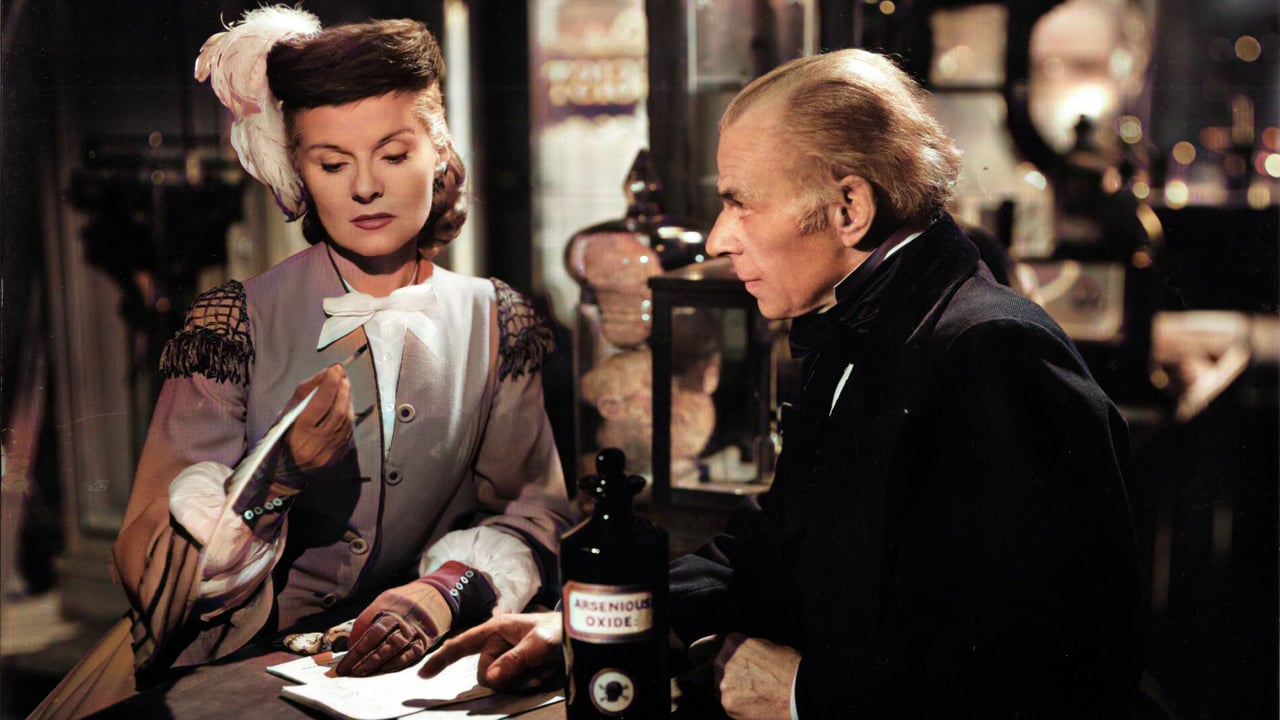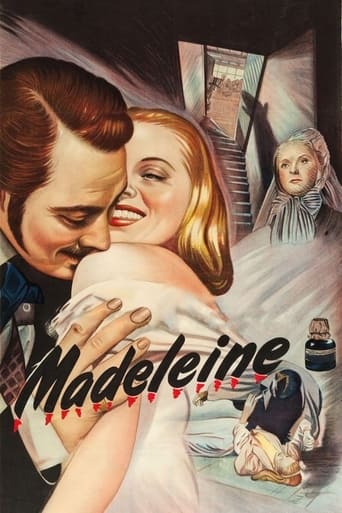

In 1850s Glasgow, beautifully-dressed Ann Todd (as Madeleine) and her family move into an immaculately-furnished, upper-classy new home. Still fetching in her 40s, Ms. Todd attracts her share of male admirers, most significantly handsome young Ivan Desny (as Emile L'Anglier). However, Todd's appearances-conscious father Leslie Banks (as James Smith) would rather his daughter marry suitable Norman Wooland (as William Minnoch). Eventually, a lover is poisoned and Todd stands accused. While Todd looks beautiful under duress, Andre Morell and Barry Jones passionately argue it out in court...This is based on a true story; Todd's character is probably supposed to be much younger, but the age difference works well, adding another dimension to her unacceptable affair. Todd delivers a Garbo-like performance. Coincidently, Greta Garbo was concurrently preparing the un-produced "Lover and Friend" (1950) with noted Todd co-star James Mason; Garbo camera tests by James Wong Howe and William Daniels by resemble some shots of Todd in this film. "Madeleine" is lacking in narrative, but the direction by David Lean and photography by Guy Green make it worth viewing.******* Madeleine (2/14/50) David Lean ~ Ann Todd, Norman Wooland, Ivan Desny, Leslie Banks
... View MoreIt is ironic that this movie is based on real events and the names have not been changed yet perversely - especially for the time - director Lean declines to show how the two lovers from such disparate backgrounds ever got together in the first place. Instead, we are presented with a fait accompli - they are an item end of story. This really isn't good enough more so since Lean does go out of his way to portray Mr Smith as a martinet in the Moulton Barratt mould and it's is almost impossible to believe that Madeleine would have had sufficient freedom to become acquainted with her low-born French lover. Yet because it is a true story they clearly did meet and fall in love in greatest secrecy and it is surely not asking too much to let us in on the facts. The first half is pure Washington Square with a plain but wealthy girl being seduced by a good-looking pauper intent on social climbing but then it becomes something else entirely once arsenic rears its ugly head. Credibility is strained again when the friend who shares a room in the rat-hole in which the lover lives informs Mr Smith that he is attached to the French Consul. Of course you are, Froggy, all Consul employees live in rat-holes, natch. There's even a nod to a previous Todd box-office hit when her lover - who always carries a cane - asks her to play the piano for him, stopping short of adding if you won't play for me you'll play for no one. The direction is competent but no better than ho hum and that goes for the acting as well.
... View MoreEnjoyed this 1950 true story about a young woman named Madeleine Smith, (Ann Todd) who lived in Glasgow, Scotland in 1857 and the story begins with the Smith family looking for a rather large home. Madeleine is very excited about a room in the basement of this house and I wondered just why she preferred such a location and of course the story will reveal the reasons for this decision. William Mennoch, (Norman Wooland) was an older professional man and was interested in Madeleine and wanted to marry her, but she kept putting off any discussions or decisions in this matter of marriage. However, the father and mother approved of William becoming their son-in-law. As the story moves along, you find out that there is another man that Madeleine is very much in love with and he is French and not very well off financially. This man's name is Emile L'Anglier and he was determined to climb into Glasgow's high social class and found that Madeleine and her family would be able to help him accomplish this task. This story holds great mystery in black and white and all the actors gave great supporting roles in this true story about a strange woman.
... View MoreAnn Todd is "Madeleine" in this 1950 film directed by David Lean. The film also features Norman Wooland, Ivan Desny, Andre Morrell and Elizabeth Sellars. The film looks at the true story of the famous Madeleine Smith murder trial in the mid-1800s. Pressured by her upper class family to marry, Madeleine is in fact secretly intimately involved with a man from a lower class, L'Anglier (Desny) and has agreed to marry him. She doesn't want to tell her family, so she urges him to elope with her. L'Anglier was planning on marrying into the upper class lifestyle and insists instead that she tell her father (Leslie Banks) about their relationship. She can't, and believing that all L'Anglier wanted was her money all along, she breaks off with him and requests the return of her letters to him. She then agrees to marry William Minnoch (Wooland), who has been courting her.L'Anglier doesn't return her letters, and after she purchases arsenic, he dies of arsenic poison, having become ill at her house once before. Madeleine is arrested for murder.The film seems to follow the case quite accurately, but it's pretty cut and dried. There are some marvelous scenes - the two dancing in the moonlight is one, as an increasingly wilder dance goes on inside. The structure of the courtroom was interesting, as I had never seen a prisoner walk upstairs into the dock from what is almost a trap door in the floor. The view of all the faces looking down before she starts the climb gives an idea of what it's like to be put on trial.Ann Todd is a good actress, though an internalized one who comes off as rather cold. She was married to Lean, which may be the reason for her casting. At the time of the murder, Madeleine's father was displeased that she wasn't married, complaining that she had met many men but none of them have worked out. She was twenty when she took up with L'Anglier and 22 when she broke it off. Todd was 41 at the time this film was made. She was not carefully photographed and looked her age - way too old for this role. Andre Morrell is excellent as Madeleine's attorney. The rest of the performances are very good, with Banks a strong, intimidating father and Desny hinting at the slime that's below the surface of L'Anglier. Norman Wooland gives a charming and concerned performance as Madeleine's suitor, Minnoch.Lean's opinion of what happened is made very clear in the last moments of the film. Someone said the story needed Hitchcock's hand, but he was not successful with "The Paradine Case." There's something about these stories that is very detached and unemotional. Maybe Hitchcock could have cracked it; this early effort by David Lean doesn't quite make it.
... View More